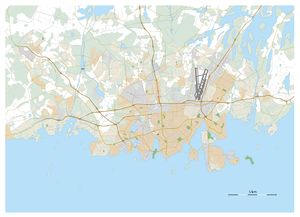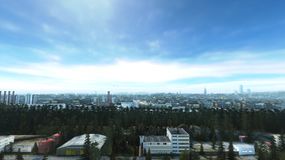Stalburg: Difference between revisions
m yes |
Grammar fixes and many other wicked fits. |
||
| Line 50: | Line 50: | ||
water pipes were built under the city and some of them are still operational. | water pipes were built under the city and some of them are still operational. | ||
=== | ===Stalburg in the early 20th Century (1900-1938)=== | ||
During the early 1900’s the slums surrounding Stalburg we’re removed and replaced with proper housing. | During the early 1900’s the slums surrounding Stalburg we’re removed and replaced with proper housing. | ||
| Line 56: | Line 56: | ||
During WW2 Stalburg suffered a lot of damage from German bombings. Many people quoted that "Stalburg was flattened to the ground" | During WW2 Stalburg suffered a lot of damage from German bombings. Many people quoted that "Stalburg was flattened to the ground" | ||
=== | ===Stalburg during the mid to late 20th Century (1945-1999)=== | ||
After the events of WW2, the city contracted the [[Bergmann Group]] to construct many of Stalburg's underground infrastructure. Bergmann got lots of help from a local company called [[Stalburg Steel]], who supplied them with steel to aid in the construction of the vast underground tunnel networks. Another company that benefited from Bergmann was [[Hammer Valley Hydro]], who relied on Bergmann's water tunnels to keep their two dams, [[Hammer Valley Dam]] and [[Two Gorges Dam]], operational. During the early 1980s, things started to go wrong in Stalburg. It started with the Bergmann Group going bankrupt due to the disappearance of [[Xeander Berg]], who had plans for an invention that would change the world of construction forever, textile-reinforced concrete. [[Eric Kleinmann]] was forced to sell his company to Jeff Walter. Next was Stalburg Steel. | After the events of WW2, the city contracted the [[Bergmann Group]] to construct many of Stalburg's underground infrastructure. Bergmann got lots of help from a local company called [[Stalburg Steel]], who supplied them with steel to aid in the construction of the vast underground tunnel networks. Another company that benefited from Bergmann was [[Hammer Valley Hydro]], who relied on Bergmann's water tunnels to keep their two dams, [[Hammer Valley Dam]] and [[Two Gorges Dam]], operational. During the early 1980s, things started to go wrong in Stalburg. It started with the Bergmann Group going bankrupt due to the disappearance of [[Xeander Berg]], who had plans for an invention that would change the world of construction forever, textile-reinforced concrete. [[Eric Kleinmann]] was forced to sell his company to Jeff Walter. Next was Stalburg Steel. The [[SNW]] wanted Stalburg Steel gone to incite civil unrest, which would cause the enforcement of Martial Law and military mandate over civilian legislative bodies, as well as bury sensitive information about S.N.W [[Mikhail Rosenthal]] acquired through his 'criminal connections'. And finally, [[Hammer Valley Hydro]]. After the Bergmann Group was gone, no one could maintain the tunnels that Hammer Valley Hydro relied on to keep their dams operational. The CEO of Hammer Valley Hydro, [[Alex Hartman]], after being forced to sell his company to Jeff Walter, got really mad at what Jeff was doing, and since then, he was searching for Walter to seek vengeance. Alex found Jeff at Rosenthal's villa in 1986, where he murdered him in cold blood. From then on, Stalburg was never the same. Many former workers of these companies ended up in [[Obenseuer]], a crumbling part of Stalburg to which homeless people are taken. | ||
=== The new Millennium (2000-2018) === | |||
Currently, much of Stalburg's infrastructure is in atrocious state, and the city is on the brink of collapsing due to the un-maintained underground tunnels. This is of course until [[Markku Siltanen]] documents the true state of Stalburg's infrastructure, which causes a massive investigation into the corruption of many politicians. One year after Mark successfully shut down the reactor [Depending on ending], which was at risk of exploding due to the collapse of the Two Gorges Dam, the city looks to be recovering, with [[National Consulting Group|NCG]] put in charge of maintaining most of Stalburg's infrastructure. | |||
==Transportation== | ==Transportation== | ||
Revision as of 22:53, 3 July 2019
| Capital City of TSL | |
|---|---|
|
| |
| |
 |
The City of Stalburg (SB) is the capital of the fictional Scandinavian country of TSL and the Greater Stalburg Region. Stalburg is located on Baltic sea with Hanseatic and Novgorodian origins. City has nearly two million citizens living within it.[1]
History
Early middle ages (before 1200)
There were small unnamed fishing village in the area of current ‘Fishermen bay’
Late middle ages (1200–1400)
Hanseatic league and Novgorodian traders founded Stalburg as iron mining settlement, in the area of currently known ‘Old town’. They also constructed small castle to protect the new founded settlement of Stalburg Between 1200’s and 1400’s the settlement grew and granted full city rights. Castle was also expanded.
Renaissance (1400–1600)
During 1400’s the original settlement suffered great damage during the Stalburg Fire. After the fire the city was decided to be relocated to the current site of the city center at a bay 5km east of the original location due it’s obscure location for port and rough cliffy terrain. The old castle was abandoned and new fort were built to cover the location of the new Stalburg.
Neoclassicism (1600–1800)
The city started to grow fast and it became wealthy and important harbor and trading city in the Baltic region. Many new sea forts were built to protect the important port. INFRA: Game Design Document
Industrialization (1800–1900)
The city’s status as important port and iron mines allowed the city to industrialize fast, boosting the city’s growth and economy even more. Many factories were constructed in districts around the times city limits and coast, such as ‘Foundry’. Railroads were also constructed. On the other side of the coin, the fast industrialization caused many people seeking jobs to migrate into the city, faster than new apartments and tenements we’re built, forming slums around the city. During that time the city also suffered some sanitation, pollution and health issues. At the late 1800’s work started on improving the sanitation and water quality. Sewers and water pipes were built under the city and some of them are still operational.
Stalburg in the early 20th Century (1900-1938)
During the early 1900’s the slums surrounding Stalburg we’re removed and replaced with proper housing.
Stalburg in WW2 (1938-1945)
During WW2 Stalburg suffered a lot of damage from German bombings. Many people quoted that "Stalburg was flattened to the ground"
Stalburg during the mid to late 20th Century (1945-1999)
After the events of WW2, the city contracted the Bergmann Group to construct many of Stalburg's underground infrastructure. Bergmann got lots of help from a local company called Stalburg Steel, who supplied them with steel to aid in the construction of the vast underground tunnel networks. Another company that benefited from Bergmann was Hammer Valley Hydro, who relied on Bergmann's water tunnels to keep their two dams, Hammer Valley Dam and Two Gorges Dam, operational. During the early 1980s, things started to go wrong in Stalburg. It started with the Bergmann Group going bankrupt due to the disappearance of Xeander Berg, who had plans for an invention that would change the world of construction forever, textile-reinforced concrete. Eric Kleinmann was forced to sell his company to Jeff Walter. Next was Stalburg Steel. The SNW wanted Stalburg Steel gone to incite civil unrest, which would cause the enforcement of Martial Law and military mandate over civilian legislative bodies, as well as bury sensitive information about S.N.W Mikhail Rosenthal acquired through his 'criminal connections'. And finally, Hammer Valley Hydro. After the Bergmann Group was gone, no one could maintain the tunnels that Hammer Valley Hydro relied on to keep their dams operational. The CEO of Hammer Valley Hydro, Alex Hartman, after being forced to sell his company to Jeff Walter, got really mad at what Jeff was doing, and since then, he was searching for Walter to seek vengeance. Alex found Jeff at Rosenthal's villa in 1986, where he murdered him in cold blood. From then on, Stalburg was never the same. Many former workers of these companies ended up in Obenseuer, a crumbling part of Stalburg to which homeless people are taken.
The new Millennium (2000-2018)
Currently, much of Stalburg's infrastructure is in atrocious state, and the city is on the brink of collapsing due to the un-maintained underground tunnels. This is of course until Markku Siltanen documents the true state of Stalburg's infrastructure, which causes a massive investigation into the corruption of many politicians. One year after Mark successfully shut down the reactor [Depending on ending], which was at risk of exploding due to the collapse of the Two Gorges Dam, the city looks to be recovering, with NCG put in charge of maintaining most of Stalburg's infrastructure.
Transportation
Rail Transport
From Stalburg Central Railway Station there are 10 regional lines that connect to other cities and towns in Stalburg Region: R10 to Forde, R11 to Forde, R12 to Illo, R130 to Ardscratch, R15 to Tilstrand, R20 to Ersfors, R21 to Koksburg, R230 to Cellecter, R30 to Sydhavn and R330 to Ploughwedge. Stalburg has 4 metro lines, that are maintained and operated by Stalburg Mass Transit. Mark will use and visit parts of the metro system during his journey. The metro system is also a way for the player to perceive the scale of the city and his movement relative to it. The metro in Stalburg is known to be poorly maintained. This causes many of it's integral parts to be unstable. In fact, Mark sees a metro train that nearly gets crushed by the tunnel behind it collapsing. This in turn causes the Public Transport Workers Union to protest almost on a weekly basis for safer working conditions.
Road Transport
Stalburg is connected by 5 motorways: M1 (west), M2 (north-west), M3 (north), M4 (north-east) and M5 (east)[2]. Presumably the M3 was used by Mark on his way to Hammer Valley, while part of the M2 was used after the blackout when Mark had to get to Blackrock Nuclear Power Plant. We get no information in game as to who is responsible for maintaining these motorways.
Air Transport
Stalburg has one airport named Stalburg International Airport (SIA). SIA has 2 runways, it's a medium sized International Airport.
Gallery
-
Image showcasing the terrific state of the metro tunnels in Stalburg.
-
The four metro lines in Stalburg.
-
Stalburg International Airport seen from the top of the Stalburg Steel blast furnace.
References
- ↑ https://imgur.com/gallery/7xSBG
- ↑ Oskutin: 1, 2, 3, 4, 5 from west to east.




